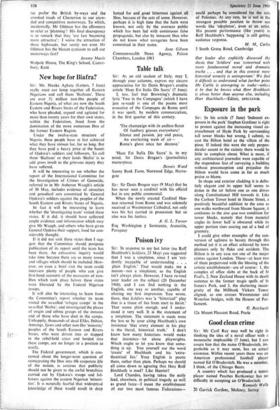Poison ivy
Sir: In response to my last letter (on Rolf Hochhuth's Soldiers, 23 May) you suggested that I was a simpleton, since. I am 'evi- dently incapable of understanding . . . plain English.' That would make me a moron—not a simpleton; so the English isn't always plain. However, I have re-read your leader on the subject (20 December 1968), and I can find nothing in the English, one way or another, capable of altering my first impression. You wrote, there, that Soldiers was 'a "historical" play that is a tissue of lies from start to finish.' That seems plain enough, and I under- stand it very well. It is the statement of a simpleton. The statement is made none the less so by your citing Hochhuth's own insistence 'that every element in his play
is the literal, historical truth.' I don't know how many historians would make that insistence—let alone playwrights. Which ought to let you know that some- thing is up. You yourself use the word 'create' of Hochhuth and his 'extra- theatrical lies.' Your English is poetic there, rather than plain. Perhaps we should all come down to agreeing that Herr Rolf Hochhuth is mad? Like Hamlet?
Lord Chandos, having taken the early lead, elsewhere, in political tragedy as well as grand farce—I mean the establishment ,of out two most famous Federations— could perhaps be considered for the role of Polonius. At any rate, he is not in the strongest possible position to throw out words like 'simpleton', even at an artist. His present performance (like yours) in Rolf Hochhuth's 'happening' is still getting audience response.
M. M. Carlin 5 South Green Road, Cambridge
Our leader also explicitly discussed the thesis that 'Soldiers' was 'concerned with more fundamental moral and dramatic truths . . . and that in this context mere historical veracity is unimportant.' We find it difficult to understand what further point Mr Carlin is attempting to make—unless it be that he knows what Herr Hochhuth is about better than anyone else, including Herr Hochhuth.—Editor, SPECTATOR.






































 Previous page
Previous page